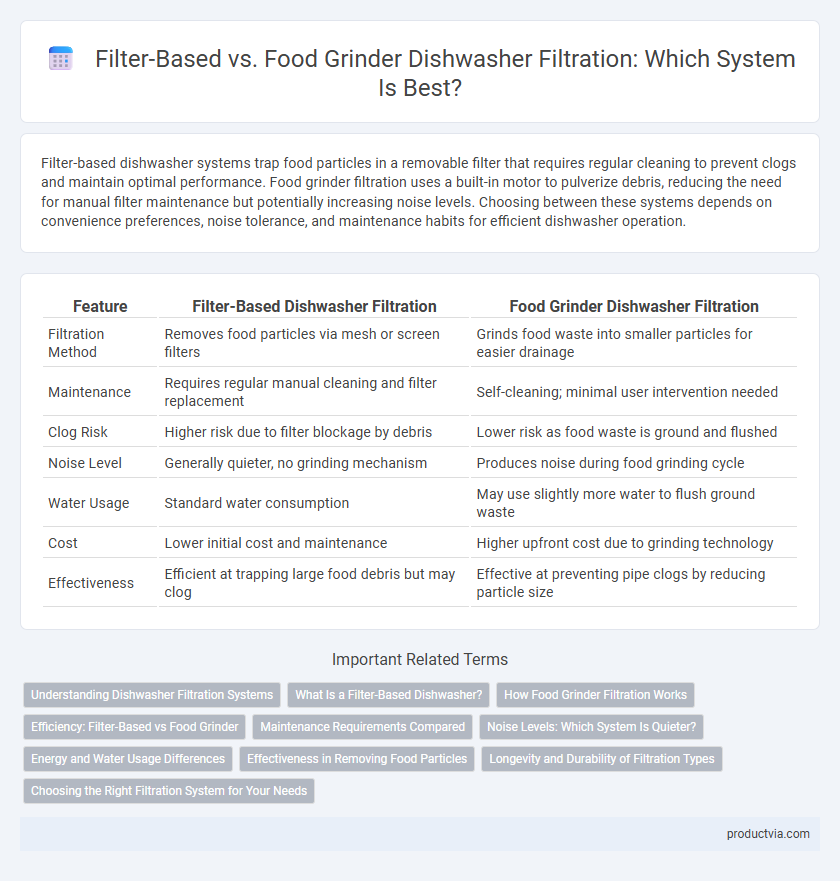Filter-based dishwasher systems trap food particles in a removable filter that requires regular cleaning to prevent clogs and maintain optimal performance. Food grinder filtration uses a built-in motor to pulverize debris, reducing the need for manual filter maintenance but potentially increasing noise levels. Choosing between these systems depends on convenience preferences, noise tolerance, and maintenance habits for efficient dishwasher operation.
Table of Comparison
| Feature | Filter-Based Dishwasher Filtration | Food Grinder Dishwasher Filtration |
|---|---|---|
| Filtration Method | Removes food particles via mesh or screen filters | Grinds food waste into smaller particles for easier drainage |
| Maintenance | Requires regular manual cleaning and filter replacement | Self-cleaning; minimal user intervention needed |
| Clog Risk | Higher risk due to filter blockage by debris | Lower risk as food waste is ground and flushed |
| Noise Level | Generally quieter, no grinding mechanism | Produces noise during food grinding cycle |
| Water Usage | Standard water consumption | May use slightly more water to flush ground waste |
| Cost | Lower initial cost and maintenance | Higher upfront cost due to grinding technology |
| Effectiveness | Efficient at trapping large food debris but may clog | Effective at preventing pipe clogs by reducing particle size |
Understanding Dishwasher Filtration Systems
Dishwasher filtration systems primarily use either filter-based or food grinder mechanisms to manage food particles during washing cycles. Filter-based systems trap debris in a removable mesh or screen, requiring periodic cleaning to maintain efficiency, while food grinder systems pulverize food waste to prevent clogs and reduce the need for manual maintenance. Understanding these filtration options helps in selecting a dishwasher that balances performance, maintenance effort, and water usage effectively.
What Is a Filter-Based Dishwasher?
A filter-based dishwasher uses a built-in filtration system to trap food particles and debris during the wash cycle, preventing them from recirculating onto dishes. These filters need regular cleaning to maintain optimal performance and avoid clogs that could affect water drainage. Filter-based dishwashers are energy-efficient and generally quieter compared to those with food grinders, making them a popular choice for home use.
How Food Grinder Filtration Works
Food grinder filtration in dishwashers operates by mechanically chopping food particles into fine debris that washes away with water flow, preventing clogging and buildup in the drainage system. This system uses a high-speed, rotating impeller to pulverize solid residues, ensuring continuous filtration without the need for manual cleaning or replacement. Compared to filter-based systems, food grinders enable more efficient waste disposal and reduce maintenance frequency by breaking down food remnants directly during the wash cycle.
Efficiency: Filter-Based vs Food Grinder
Filter-based dishwasher systems excel in efficiency by trapping food particles to prevent clogging and enabling easy cleaning, which maintains optimal water circulation and washing performance. Food grinders, while reducing large debris, often allow smaller food particles to recirculate, potentially compromising wash quality and increasing maintenance needs. The precise capture efficiency of filter-based systems typically results in superior cleaning outcomes and longer appliance lifespan.
Maintenance Requirements Compared
Filter-based dishwasher systems require regular manual cleaning to remove trapped food particles, preventing clogs and maintaining optimal water flow. Food grinder models grind food debris into fine particles that are flushed away, reducing the frequency of manual maintenance but increasing potential wear on mechanical parts. Maintenance for filter-based systems typically involves periodic rinsing or replacement of filters, while food grinders demand occasional inspections and possible repairs due to motor strain.
Noise Levels: Which System Is Quieter?
Filter-based dishwasher systems typically produce lower noise levels because they rely on passive filtration that traps food debris without mechanical grinding. Food grinder systems operate with a motorized component to crush particles, generating more noise during the wash cycle. Studies show filter-based models average around 40-45 decibels, making them quieter compared to food grinders, which can reach 50 decibels or higher.
Energy and Water Usage Differences
Filter-based dishwashers typically consume less water due to their ability to recirculate and reuse rinse water by trapping food particles in a removable filter, reducing overall water usage. Food grinder systems, however, use more water and energy as they continuously break down food residues and flush them out, requiring higher water flow and longer cycles. Energy efficiency is generally higher in filter-based dishwashers because the motor runs less frequently and the filtration process is less intensive compared to the energy demands of grinding components.
Effectiveness in Removing Food Particles
Filter-based dishwasher filtration systems effectively trap larger food particles and debris, preventing clogs and enhancing cleaning performance through physical barriers. Food grinders, on the other hand, pulverize food residue into smaller particles, reducing buildup but risking redeposition on dishes if not paired with sufficient water pressure and drainage. Studies show filter-based systems consistently outperform grinders in removing substantial food waste, ensuring cleaner dishes and less maintenance over time.
Longevity and Durability of Filtration Types
Filter-based dishwasher filtration systems offer superior longevity due to their reusable mesh filters that require regular cleaning, preventing clogging and wear. Food grinder systems experience more mechanical stress because they continuously grind food particles, which can lead to faster wear and reduce overall durability. Consequently, filter-based systems tend to have a longer lifespan and maintain filtration efficiency over time compared to food grinders.
Choosing the Right Filtration System for Your Needs
Filter-based dishwasher systems capture food particles on a mesh screen, requiring regular cleaning to maintain performance, while food grinder systems grind debris into fine particles that drain away, reducing filter maintenance but potentially increasing wear over time. Selecting the right filtration system depends on factors such as frequency of dishwasher use, water hardness, and the type of food residues typically washed. For households with heavy food waste or softer water, grinder systems may offer convenience, whereas filter-based systems provide better control over debris removal in low to moderate usage scenarios.
Filter-based vs food grinder for dishwasher filtration Infographic

 productvia.com
productvia.com